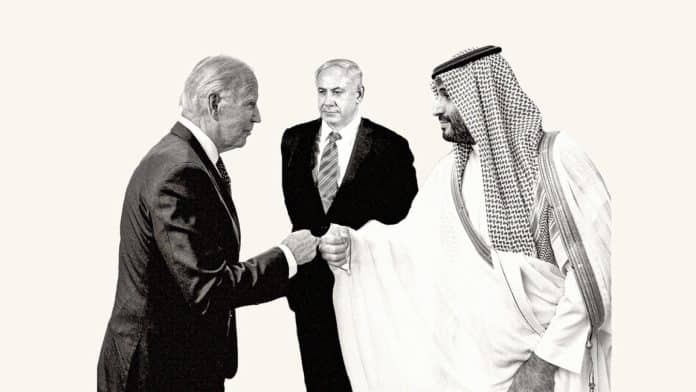Saudi state media says US national security adviser and Saudi crown prince held talks on ‘semi-final version of draft,’ end to Gaza war, setting up Palestinian state
US President Joe Biden’s national security adviser met early Sunday with Saudi Arabia’s Crown Prince Mohammed bin Salman to discuss what the kingdom described as the “semi-final” version of a wide-ranging security agreement between the countries.
The agreements are considered a major part of Washington’s efforts to bring Riyadh around to recognizing the State of Israel for the first time — efforts complicated by the ongoing war in Gaza.
Saudi state media released no images of Jake Sullivan and Prince Mohammed’s meeting in Dhahran, a city in the kingdom’s far east that’s home to its state-run oil giant, the Saudi Arabian Oil Co. known as Saudi Aramco.
“The semi-final version of the draft strategic agreements between the kingdom and the United States of America, which are almost being finalized — and what is being worked on between the two sides in the Palestinian issue to find a credible path — were discussed,” the statement released after the talks said.
That included “a two-state solution that meets the aspirations and legitimate rights of the Palestinian people” and “the situation in Gaza and the need to stop the war there and facilitate the entry of humanitarian aid,” the statement added.
The US has said in the past that the deal hinges on a normalization component with Israel that would require the latter to also agree on a pathway for a future Palestinian state.
After his visit to Saudi Arabia, Sullivan is due to visit Israel, where he will meet with Prime Minister Benjamin Netanyahu to update him on his talks in Riyadh and also discuss Israel’s planned expanded military operation in Rafah, a US official told The Times of Israel.
Saudi Arabia has long called for an independent Palestinian state to be created along Israel’s 1967 borders, with East Jerusalem as its capital. However, that is likely untenable for Netanyahu, whose government hinges on support from hardliners who oppose a two-state solution and support Israeli settlements on lands Palestinians want for that state.
The war in the Gaza Strip and its influence on relations with Saudi Arabia gained urgency on Saturday when war cabinet minister Benny Gantz issued an ultimatum on a number of topics, including Saudi normalization, as a condition for keeping his National Unity party in the emergency government, which he joined after the war started. In response, the Prime Minister’s Office issued a statement saying that Netanyahu opposes “establishing a Palestinian state that will inevitably be a terror state.”
The war erupted on October 7 when the Palestinian terror group Hamas led a massive cross-border attack on Israel that killed 1,200 people. The terrorists who burst through the border with the Gaza Strip also abducted 252 people as hostages to Gaza.
Israel responded to the attack with a military offensive to destroy Hamas, topple its Gaza regime, and free the hostages.
During US Secretary of State Anthony Blinken’s last visit to Riyadh in April, he and his Saudi counterpart said that a final agreement on the US-Saudi component of the deal was close.
Saudi Arabia has long relied — like other Gulf Arab nations — on the US to be the security guarantor for the wider Middle East as tensions over Iran’s nuclear program in recent years have spilled over into a series of attacks. The proposal now being discussed likely would deepen that, and also reportedly includes access to advanced weapons and possibly trade deals as well.
Saudi Arabia has also pushed for nuclear cooperation in the deal that includes America allowing it to enrich uranium in the kingdom — something that worries nonproliferation experts, as spinning centrifuges opens the door to a possible weapons program. Prince Mohammed has said the kingdom would pursue a nuclear weapon if Iran had one. Iran in recent weeks has increasingly threatened it could do so.
Saudi Arabia, as the world’s largest oil exporter, is not an obvious candidate for a nuclear pact typically aimed at building power plants.
But the kingdom is seeking to generate substantial renewable energy and reduce emissions under an ambitious long-term plan, while critics say Riyadh might want nuclear expertise in case it someday wished to acquire nuclear weapons, despite safeguards enshrined in any deal with Washington to prevent this.
Iran, US communicate
Iran’s mission to the United Nations in New York, meanwhile, confirmed that Tehran had held indirect talks with US officials in Oman last week. Iran’s state-run IRNA news agency quoted the mission as describing the talks as “an ongoing process.”
“The negotiations have not been the first and will not be the last of their kind,” the mission said, according to IRNA.
Oman, a sultanate on the eastern edge of the Arabian Peninsula, has been the site of US-Iran talks in the past, including under Biden despite the tensions between the two nations.













